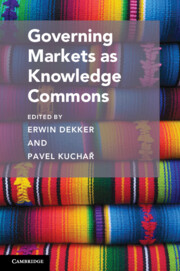Book contents
- Governing Markets as Knowledge Commons
- Cambridge Studies on Governing Knowledge Commons
- Governing Markets as Knowledge Commons
- Copyright page
- Contents
- Contributors
- Preface
- Acknowledgments
- Introduction
- 1 The Contribution Good as the Foundation of the Industrial Revolution
- 2 On the Social Evolution of Knowledge
- 3 Individual Sovereignty and Coproduction of Knowledge Governance
- 4 Common Sense Commons
- 5 Conventions as Shared Cognitive Infrastructures
- 6 Property Rights, Knowledge Commons, and Blockchain Governance
- 7 Knowledge Commons, Social Infrastructures, and Informal Markets
- 8 Entrepreneurship and Governance in the Scotch Whisky Knowledge Commons
- 9 Trolling in the Deep
- 10 Crowdfunding the Queer Museum
- 11 Understanding Different Qualities of the Knowledge Commons in Contemporary Cities
- References
3 - Individual Sovereignty and Coproduction of Knowledge Governance
Published online by Cambridge University Press: 09 December 2021
- Governing Markets as Knowledge Commons
- Cambridge Studies on Governing Knowledge Commons
- Governing Markets as Knowledge Commons
- Copyright page
- Contents
- Contributors
- Preface
- Acknowledgments
- Introduction
- 1 The Contribution Good as the Foundation of the Industrial Revolution
- 2 On the Social Evolution of Knowledge
- 3 Individual Sovereignty and Coproduction of Knowledge Governance
- 4 Common Sense Commons
- 5 Conventions as Shared Cognitive Infrastructures
- 6 Property Rights, Knowledge Commons, and Blockchain Governance
- 7 Knowledge Commons, Social Infrastructures, and Informal Markets
- 8 Entrepreneurship and Governance in the Scotch Whisky Knowledge Commons
- 9 Trolling in the Deep
- 10 Crowdfunding the Queer Museum
- 11 Understanding Different Qualities of the Knowledge Commons in Contemporary Cities
- References
Summary
Common pooling of knowledge goods requires effective governance institutions to avoid over depletion or under provision. Following recent literature, this chapter treats the institutions of knowledge goods governance as dually coproduced in provision and common pool in consumption. I combine a notion of individual sovereignty from political economy with a scalar analysis of the knowledge content of goods exchanged within a community. Insofar as the economic value of goods depends on knowledge content, and less on physical expression, exchange acts are speech acts. Therefore, communities where individuals have high exchange rights also feature a high form of speech rights. In these contexts, agents contribute to governance as an outcome of their ordinary economic activity. Therefore, entrepreneurship within rules and entrepreneurship to alter rules are not distinct actions. The paper relies on a combination of constitutive and regulative rules within a community, as defined by economic and social rather than geographic or political boundaries. Individuals use sovereign exchange and speech acts to interact within given rules, and in doing so they also contribute to the coproduction of governance, acting at once as both economic and institutional entrepreneurs.
- Type
- Chapter
- Information
- Governing Markets as Knowledge Commons , pp. 89 - 112Publisher: Cambridge University PressPrint publication year: 2021
References
- 1
- Cited by

